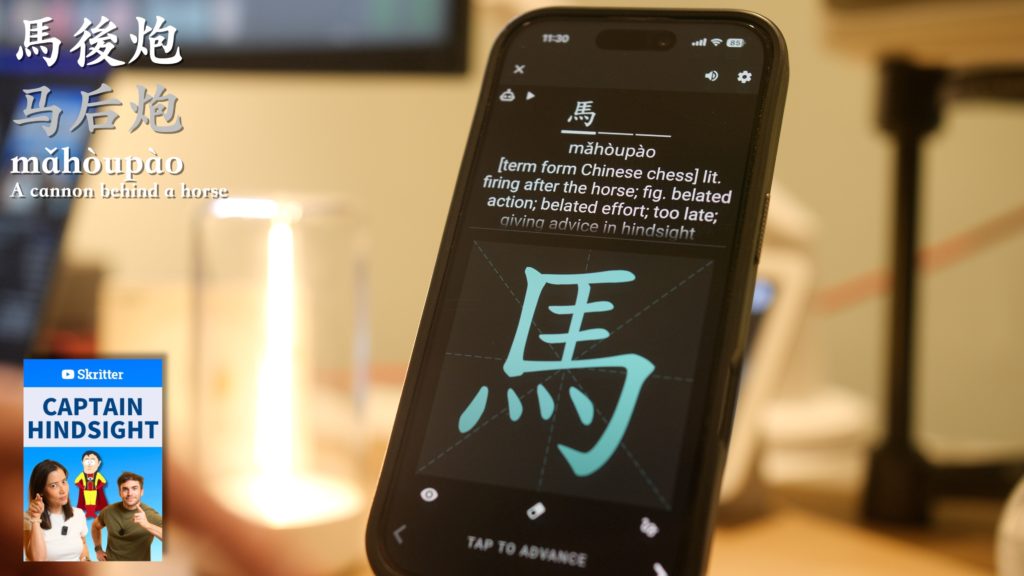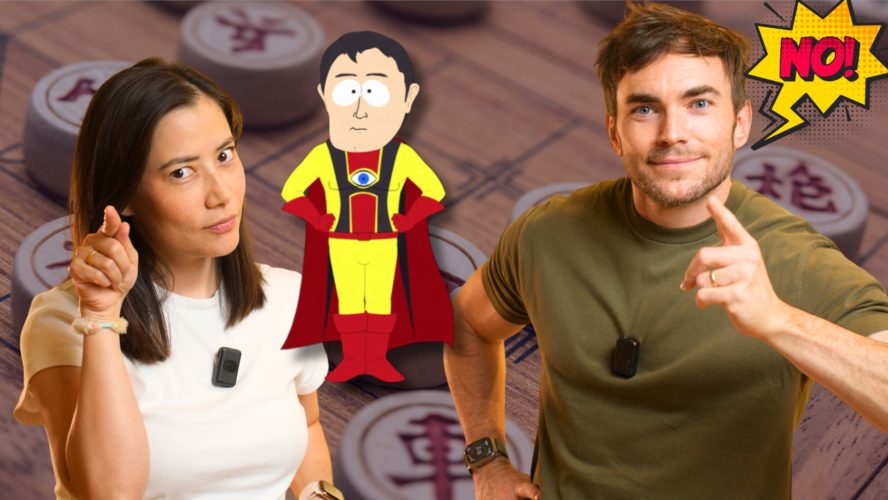We all know that one person. You make a mistake, break a mug, or fail a test, and they immediately chime in with: “You really should have been more careful” or “I knew that was going to happen.”
In English, we call these people “Monday Morning Quarterbacks” or “Captain Hindsight.” They are the people who offer criticism or advice only when it is far too late to be useful.
In Chinese, there are two fantastic idioms to describe this behavior—one involving a chess move, and the other involving a legendary strategist.
Here is how to spot them, and more importantly, how to tell them to stop!
1. The “Cannon Behind the Horse” (馬後炮)
Pinyin: Mǎ hòu pào Literal Meaning: Horse-Behind-Cannon
This phrase comes from Chinese Chess (象棋 – Xiàngqí). In the game, the “Cannon behind the Horse” is actually a powerful, decisive checkmate move. It is effective and usually wins the game.
However, in daily life, the meaning has completely flipped. It describes firing a cannon after the horse has already left. If you take the action after the opportunity has passed, you missed your target.
In modern Mandarin, 馬後炮 / 马后炮 (mǎ hòu pào) refers to useless advice, criticism, or actions taken after the outcome of a situation is already decided. It is the classic “Monday Morning Quarterback.”
Example:
别放马后炮了,快帮我想想办法补救吧!
別放馬後炮了,快幫我想想辦法補救吧!
Bié fàng mǎhòupào le, kuài bāng wǒ xiǎng xiǎng bànfǎ bǔjiù ba!
Stop acting like a “Monday Morning Quarterback” (firing cannons behind the horse), and help me think of a way to fix this!

2. The “After-the-fact Zhuge Liang” (事後諸葛)
Pinyin: Shì hòu Zhū gě Literal Meaning: After-the-event Zhuge Liang
Zhuge Liang (諸葛亮) was a legendary strategist and statesman during the Three Kingdoms period. He was famous for his wisdom and his ability to predict the future.
An 事後諸葛 / 事后诸葛 (shì hòu Zhūgē) is someone who claims to have the wisdom of Zhuge Liang, but only after the event has occurred. It satirizes people who claim to have had foresight when they really only have hindsight.
Fun Fact: Although Zhuge Liang lived nearly 2,000 years ago, this specific idiom is surprisingly modern! It first appeared in the 1970s in a novel called 煤城怒火.

Example:
事情發生前你不說,現在才來當事後諸葛。 Shìqíng fāshēng qián nǐ bù shuō, xiànzài cái lái dāng shìhòuzhūgě. You didn’t say anything before it happened, and only now you’re acting like an after-the-fact genius.
How to Fight Back (3 Useful Retorts)
If someone is annoying you with hindsight advice, you don’t have to just take it. Here are three phrases you can use to point out their unhelpful behavior.
1. The Direct Approach
別說了!你現在在這邊放馬後炮,事情是能改變嗎?
別说了!你现在在这边放马后炮,事情是能改变吗?
Bié shuō le! Nǐ xiànzài zài zhèbiān fàng mǎhòupào, shìqíng shì néng gǎibiàn ma?
Stop talking! You’re just firing ‘cannons behind the horse’ here; can that change anything?
2. Calling Out the Fake Genius
早不說,晚不說,在那邊事後諸葛有什麼用?
早不说,晚不说,在那边事后诸葛有什么用?Zǎo bù shuō, wǎn bù shuō, zài nàbiān shìhòuzhūgě yǒu shénme yòng?
You didn’t say it earlier, you didn’t say it later—what is the use of acting like an ‘After-the-fact Zhuge Liang’ right now?
3. The “You Do It Then” Defense
說得很簡單,你行你上啊!
说得很简单,你行你上啊!
Shuō de hěn jiǎndān, nǐ xíng nǐ shàng a!
It’s easy to say… if you can do it, you go up and do it!
Conclusion
Don’t be a 馬後炮 (mǎ hòu pào)! Instead of waiting until you fail a test to say “I should have studied,” show some 先見之明 (xiān jiàn zhī míng – foresight) and start practicing your vocabulary today.


